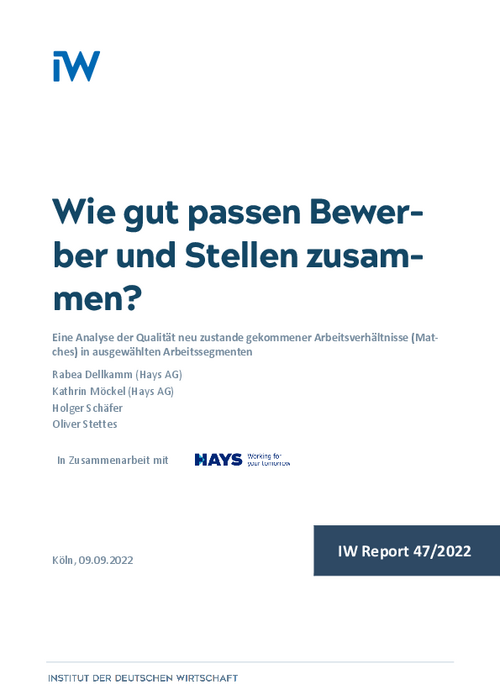Due to data restrictions, existing empirical research currently fails to exactly determine the quality of newly established employee-employer-matches.

How well do applicants and jobs match?

Due to data restrictions, existing empirical research currently fails to exactly determine the quality of newly established employee-employer-matches.
While data on job requirements for specific positions are frequently available, large-scale information on the skill endowment of the recently hired corresponding persons is scarce, except for the IAB-Job-Vacancy-Survey. Unfortunately, the latter only provides data on the most recently settled contract of each of the responding establishments. By exploiting a unique dataset of 50,000 new matches that informs about both the skill requirements of a filled position and the skill endowment of the corresponding entrant we can construct an indicator of the average match-quality.
The analysis reveals that match-quality notably differs between occupations and industries. In addition, the evidence suggests that the accuracy of fit has, on average, slightly deteriorated. Furthermore, the quality of those matches where older workers eventually fill the positions is remarkably higher than that of matches where employees aged 29 or below are hired. Finally, the assignment of freelancers or temporary-agency-workers comes, on average, along with a higher accuracy of fit of the match than recruiting permanent staff.
Though the applied dataset is not representative, our study presents a methodology for analysing the results of matching processes in the labour market in more detail. In this respect, it provides a promising starting point for complementing studies on mismatch-unemployment, on the quantitative volume of shortages of skilled labour and comparisons between job requirements and skill endowment of incumbent workers. Estimating the average match-quality may contribute to gain a deeper understanding of how imbalances of labour demand and labour supply translate into shortages of appropriately skilled workers.

How well do applicants and jobs match?

More on the topic

Orphaned executive chairs in German companies
In 2023, half of the companies in Germany reported increasing problems in filling vacancies for management positions because employees are not aiming for a career. Larger companies are less affected than small companies.
IW
Office work in transition: Analysis of the working conditions of office workers
Office work has changed considerably over time and reflects both technical progress and the zeitgeist of the decades.
IW